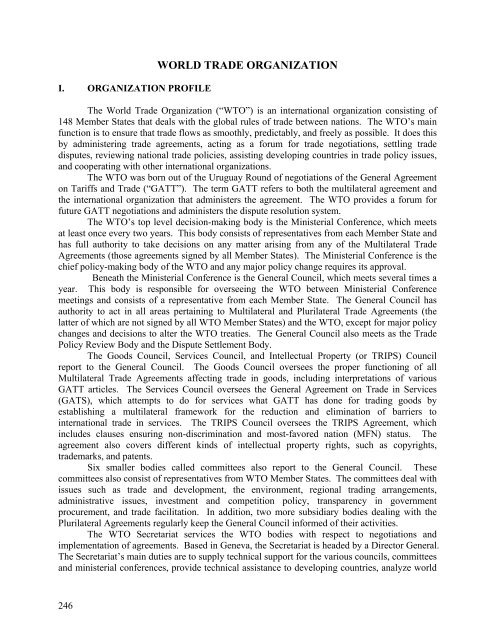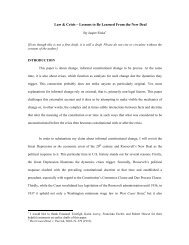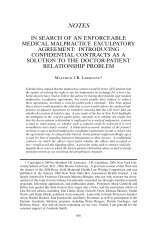Guide to Foreign and International Legal Citations - New York ...
Guide to Foreign and International Legal Citations - New York ...
Guide to Foreign and International Legal Citations - New York ...
You also want an ePaper? Increase the reach of your titles
YUMPU automatically turns print PDFs into web optimized ePapers that Google loves.
I. ORGANIZATION PROFILE<br />
246<br />
WORLD TRADE ORGANIZATION<br />
The World Trade Organization (“WTO”) is an international organization consisting of<br />
148 Member States that deals with the global rules of trade between nations. The WTO’s main<br />
function is <strong>to</strong> ensure that trade flows as smoothly, predictably, <strong>and</strong> freely as possible. It does this<br />
by administering trade agreements, acting as a forum for trade negotiations, settling trade<br />
disputes, reviewing national trade policies, assisting developing countries in trade policy issues,<br />
<strong>and</strong> cooperating with other international organizations.<br />
The WTO was born out of the Uruguay Round of negotiations of the General Agreement<br />
on Tariffs <strong>and</strong> Trade (“GATT”). The term GATT refers <strong>to</strong> both the multilateral agreement <strong>and</strong><br />
the international organization that administers the agreement. The WTO provides a forum for<br />
future GATT negotiations <strong>and</strong> administers the dispute resolution system.<br />
The WTO’s <strong>to</strong>p level decision-making body is the Ministerial Conference, which meets<br />
at least once every two years. This body consists of representatives from each Member State <strong>and</strong><br />
has full authority <strong>to</strong> take decisions on any matter arising from any of the Multilateral Trade<br />
Agreements (those agreements signed by all Member States). The Ministerial Conference is the<br />
chief policy-making body of the WTO <strong>and</strong> any major policy change requires its approval.<br />
Beneath the Ministerial Conference is the General Council, which meets several times a<br />
year. This body is responsible for overseeing the WTO between Ministerial Conference<br />
meetings <strong>and</strong> consists of a representative from each Member State. The General Council has<br />
authority <strong>to</strong> act in all areas pertaining <strong>to</strong> Multilateral <strong>and</strong> Plurilateral Trade Agreements (the<br />
latter of which are not signed by all WTO Member States) <strong>and</strong> the WTO, except for major policy<br />
changes <strong>and</strong> decisions <strong>to</strong> alter the WTO treaties. The General Council also meets as the Trade<br />
Policy Review Body <strong>and</strong> the Dispute Settlement Body.<br />
The Goods Council, Services Council, <strong>and</strong> Intellectual Property (or TRIPS) Council<br />
report <strong>to</strong> the General Council. The Goods Council oversees the proper functioning of all<br />
Multilateral Trade Agreements affecting trade in goods, including interpretations of various<br />
GATT articles. The Services Council oversees the General Agreement on Trade in Services<br />
(GATS), which attempts <strong>to</strong> do for services what GATT has done for trading goods by<br />
establishing a multilateral framework for the reduction <strong>and</strong> elimination of barriers <strong>to</strong><br />
international trade in services. The TRIPS Council oversees the TRIPS Agreement, which<br />
includes clauses ensuring non-discrimination <strong>and</strong> most-favored nation (MFN) status. The<br />
agreement also covers different kinds of intellectual property rights, such as copyrights,<br />
trademarks, <strong>and</strong> patents.<br />
Six smaller bodies called committees also report <strong>to</strong> the General Council. These<br />
committees also consist of representatives from WTO Member States. The committees deal with<br />
issues such as trade <strong>and</strong> development, the environment, regional trading arrangements,<br />
administrative issues, investment <strong>and</strong> competition policy, transparency in government<br />
procurement, <strong>and</strong> trade facilitation. In addition, two more subsidiary bodies dealing with the<br />
Plurilateral Agreements regularly keep the General Council informed of their activities.<br />
The WTO Secretariat services the WTO bodies with respect <strong>to</strong> negotiations <strong>and</strong><br />
implementation of agreements. Based in Geneva, the Secretariat is headed by a Direc<strong>to</strong>r General.<br />
The Secretariat’s main duties are <strong>to</strong> supply technical support for the various councils, committees<br />
<strong>and</strong> ministerial conferences, provide technical assistance <strong>to</strong> developing countries, analyze world
















